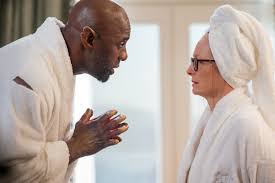It seemed fitting to move on to this fantasy depiction of a Royal world, or more specifically, the school years of Crown Prince Wilhelm of Sweden at a private academy which resembles a Swiss finishing school.
As we saw in series 1, Wilhelm has discovered he is gay and his relationship with Simón, son of Latin immigrants, not only ruffles feathers because of the gender but also his social class.
Series 2 focuses largely on the rivalry between Wille, left as the sole heir when his older brother is killed in an accident, and his cousin August (Malte Gardinger), who is back-up heir and a nasty piece of work.
Simon and Wille begin the series of 6 episodes distanced and it is only in the last 3 episodes that they come back together to give the series some of the magic it needs.
Apart from that, we have Sara (Frida Argento), Simon’s sister joining the academy and she wreaks havoc wherever she goes and Simon has a potential new love interest in Marcus (Tommy Wattring), a local stablehand and odd job man.
It has to be said that the school with its veneer of tradition and then its freedom for the pupils is a bit of a farce but I guess that is so when your clients are rich and socially well-connected. Nonetheless, the constant tension between these two factors also reflects the court and therefore the lives of the protagonists.
As Wille, Edvin Ryding confirms his ability to squeeze nuances out of a tricky role, while Omar Rudberg continues to shine as Simon. Most of the adults seem to be a bit slow (especially the Queen) although a new psychologist Wille is sent to shows a bit more sense than most. The majority of the students continue to seem too old for the roles they are playing.
All in all, it is light entertainment, but a third series would need to move forward quite a bit from these enclosed parlour games to justify being watched.
3 stars








































































